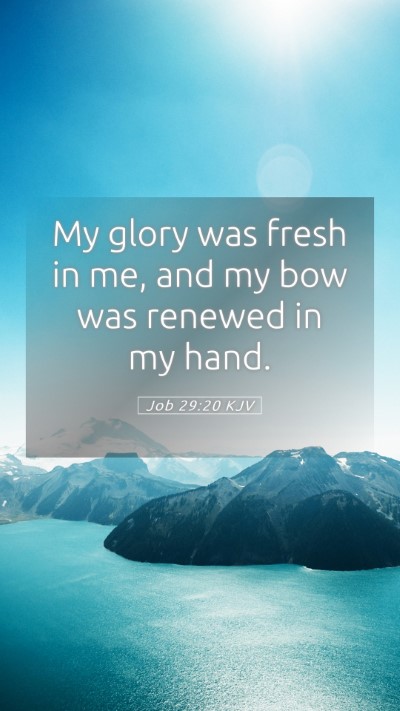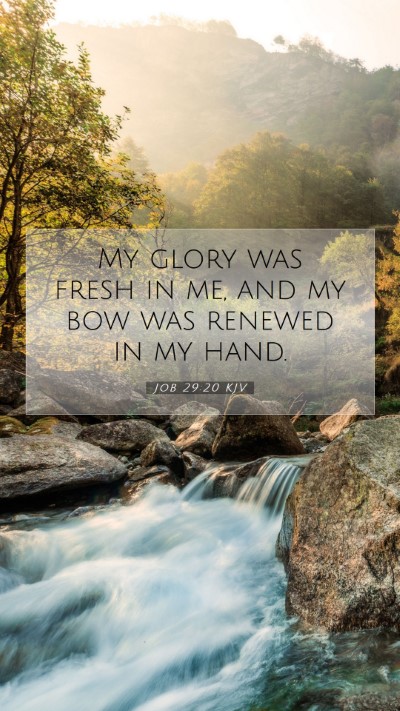Old Testament
Genesis Exodus Leviticus Numbers Deuteronomy Joshua Judges Ruth 1 Samuel 2 Samuel 1 Kings 2 Kings 1 Chronicles 2 Chronicles Ezra Nehemiah Esther Job Psalms Proverbs Ecclesiastes Song of Solomon Isaiah Jeremiah Lamentations Ezekiel Daniel Hosea Joel Amos Obadiah Jonah Micah Nahum Habakkuk Zephaniah Haggai Zechariah MalachiJob 29:20 Meaning
What is the meaning of Job 29:20?
My glory was fresh in me, and my bow was renewed in my hand.
Job 29:20 Bible Verse Meaning
Bible Verse Meaning of Job 29:20
Job 29:20 states: "My glory was fresh in me, and my bow was renewed in my hand." This verse encapsulates Job’s reminiscences about his former state of prosperity, esteem, and spiritual vitality before his trials began. Understanding this verse necessitates examining its broader context within the Book of Job, which addresses themes of suffering, righteousness, and divine justice.
Summary of Verse Insights
This verse is rich with meaning and requires a nuanced interpretation to grasp its significance fully. It conveys a time in Job’s life when he felt dignified and empowered, demonstrating an aura of glory that was palpable to himself and those around him. The imagery of his bow being renewed signifies strength, capability, and readiness—attributes he recognizes as distant due to his current afflictions.
Bible Verse Commentary
Matthew Henry notes that Job reflects on his former state of favor with God, highlighting how his life was filled with glory. Henry emphasizes that Job’s past was characterized by divine blessings and social respect, contrasting sharply with his present misery. This duality serves to deepen the reader's understanding of Job’s lament and positions the verse within the broader narrative of loss and reclamation.
Albert Barnes provides an explanation that underlines the contrast between Job’s past and present conditions. He elaborates on the metaphor of "my bow was renewed," interpreting it as Job’s original vigor and capability being replenished, akin to an archer preparing for battle. This implies a longing for the power and influence he once wielded, fostering an emotional undercurrent of yearning for restoration.
Adam Clarke further expounds that Job’s reference to glory indicates a time when he was esteemed among his peers for his integrity and wisdom. Clarke contextualizes this by noting that in ancient Near Eastern cultures, one's glory was often tied to social standing and respect, thus adding layers to Job's sense of loss during his suffering. Clarke’s insights reveal how Job's spiritual and social identities are intertwined, marking the importance of community validation in one's life.
Understanding Scripture Through This Verse
Job 29:20 is not merely a statement of nostalgia but a critical reflection on identity, social dynamics, and the psychological impact of suffering. For many believers, this verse serves as a reminder of how personal struggles can cause a profound disconnect from one’s previous self.
- Historic Context: Understanding the context of Job’s life provides essential insight into his declarations. The patriarchal society revered honor and familial lineage, which influences Job's reflections on his former glory.
- Theological Implications: Job’s statements echo questions of divine favoritism and justice—topics of great interest for biblical scholars seeking comprehension of the suffering righteous.
- Personal Reflection: Many individuals dealing with difficult times turn to this verse, pondering how glory and hardship coexist within their narratives.
Application of Job 29:20 in Daily Life
This verse can inspire individuals to reflect on their own lives and the glory they once felt in times of stability and strength. It serves as an invocation to remember past victories, both in faith and life, as a means of encouragement during difficult times. The idea of renewal—aptly depicted by the metaphoric 'bow'—offers hope that one can regain strength and purpose after loss.
Related Bible Cross References
- Job 30:20-22: Job’s continued lamentation and feeling of abandonment.
- Job 22:28: The assurance that declaring a thing can lead to manifestation—ties to Job’s declarations of former glory.
- Psalm 30:5: “Weeping may endure for a night, but joy comes in the morning,” highlighting the cyclical nature of suffering and renewal.
Conclusion
Job 29:20 encapsulates profound themes that resonate with many believers, making it a vital scripture for personal reflection and group study. Through understanding this verse, one gains insights into the complexities of human experience, the impact of divine favor, and the hope of renewal. This commentary aims to enrich the reader's engagement with the text, encouraging further exploration in Bible study groups and online Bible studies.


